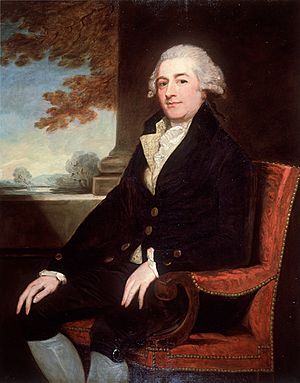Edward Loveden Loveden facts for kids

Edward Loveden Loveden (born around 1749-1751, died 1822) was an important person in English politics. He was a Member of Parliament, often called an MP. This means he was elected to represent people in the British government. He was sometimes seen as a Whig politician, but he often voted independently.
Contents
Edward Loveden Loveden's Life
Edward Loveden Loveden was born with the name Edward Loveden Townsend. His exact birth year is a bit unclear, but it was either 1749, 1750, or 1751. His father, Thomas Townsend, was from Cirencester in Gloucestershire. His mother, Jane, was from Buscot, which was then in Berkshire.
Edward went to Winchester College for three years until 1765. After that, he started studying at Trinity College, Oxford in 1767. By this time, his father had passed away.
Why His Name Changed
In 1772, Edward changed his name to Edward Loveden Loveden. This was done by a special official permission called a royal license. He had to change his name because a relative, Edward Loveden, made it a condition for him to inherit the family estate. This estate included the manor at Buscot. Edward Loveden Loveden later owned Buscot Park, which is near Faringdon in what is now Oxfordshire.
His Time as an MP
Edward Loveden Loveden first became an MP in 1783. He won a special election for the Abingdon constituency. This election happened because the previous MP had died. When he first joined, he was against the government at the time. He said he was a "free agent," meaning he didn't belong to any specific political group.
In the same year, he joined the Thames Navigation Commission. This group worked on improving the River Thames for boats. He became very active in this commission starting in 1789.
Edward kept his seat in Parliament in the 1784 election. Even though some people in his area thought he was a bit too careful with money, he won again in 1790. By 1793, he was working with a group of politicians known as the "third party."
From 1793, he also became a member of the Board of Agriculture. This was around the time he finished his most active work with the Thames Commission.
Different Parliamentary Seats
Edward lost his Abingdon seat in 1796. He also tried to win one of the two Berkshire seats in the election that year, but he didn't succeed. However, he returned to Parliament later. From 1802 to 1812, he served as the MP for Shaftesbury.
Other Important Roles
In 1805, Edward Loveden Loveden was chosen as a Fellow of the Royal Society. This is a very old and respected group for scientists. He also held important local positions. He was the High Sheriff of Berkshire from 1781 to 1782. Later, he was the High Sheriff of Brecknockshire in Wales from 1799 to 1800.
He also served in the military as an officer. He was a captain in the Berkshire Militia starting in 1779. From 1794 to 1796, he was a Lieutenant-Colonel in the same militia.
Edward Loveden Loveden's Family
Edward Loveden Loveden was married three times. His first marriage was in 1773 to Margaret Pryse. She was from Gogerddan, Cardiganshire, in Wales. They had one son and two daughters together. Sadly, Margaret passed away in 1784.
The next year, in 1785, he married Elizabeth Nash. She was a widow and the daughter of another MP, John Darker. Elizabeth died in 1788.
In 1794, Edward married for the third time to Anne Lintall. Her father was Thomas Lintall.
Edward's son became known as Pryse Pryse. He also became an MP, just like his father. He inherited money and land in Wales that came from his mother's family.
See also
- Buscot Lock
- Pryse baronets
 | Chris Smalls |
 | Fred Hampton |
 | Ralph Abernathy |

